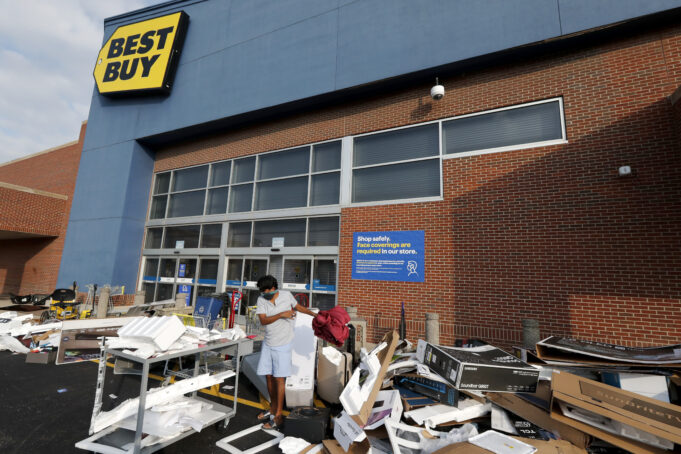by Naba’a Muhammad, Starla Muhammad and Tariqah Shakir-Muhammad
CHICAGO—According to the mayor and the city’s top cop, the police shooting of a 20-year-old Black male in a poor neighborhood led to a rampage through the Magnificent Mile, a premier downtown shopping and tourism destination.
Instead of tearing up the ‘hood, police said crowds hit the 13-block area and nearby White communities smashing and grabbing high scale items from Gucci, Apple, Nordstrom’s, other major stores and smaller shops.
“We’re coming for you,” vowed an angry Mayor Lori Lightfoot who was flanked by Police Superintendent David Brown Aug. 10, and blasted clear “criminality” not linked to anti-police brutality protests, social injustice or racial oppression.
Images of the broken glass, cars pulling up and people walking or running away with armfuls of clothes and merchandise, reports of U-Haul vans loaded with booze drew anger.
Police said social media posts called for the strike on the Magnificent Mile and 400 officers were deployed downtown. Still the cops were unable to stop the crime and looting that hit Macy’s, Old Navy, pricey shoe stores, watch and jewelry shops and enraged business leaders previously upset by protests and the Covid-19 shutdown.
Within seven hours, police reported over 100 arrests and 13 officers injured.
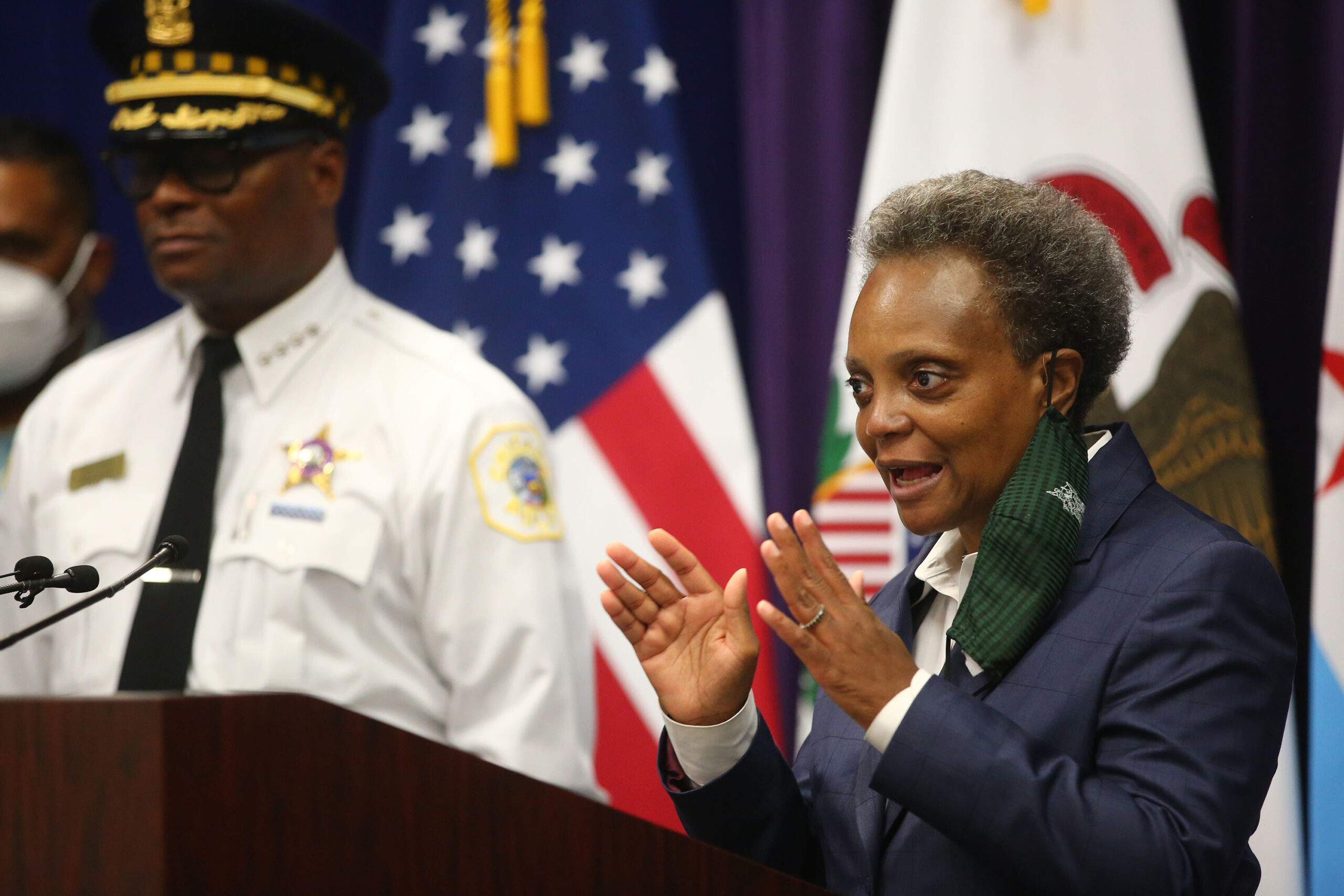
“These were not poor people engaged in petty theft to feed themselves and their families, this was straight-up felony, criminal conduct,” declared Mayor Lightfoot.
Many declared a crackdown was needed and some preachers, activists and aldermen joined that chorus. Bring in the National Guard, bring in the feds, bring in anyone who can bring order, they say.
Many worried a city hit by increased violence and economic woes was spiraling out of control. Tourism is the lifeblood for the city and if fears rise what happens? Millions have been invested in the Magnificent Mile and it helps bring some 60 million people to the city.
That investment, say business leaders, owners and others must be protected.
Others doubt an increased police presence and prison for more people will resolve real problems—poverty, disinvestment and social insecurity on many different levels.
“To me, at this point there has to be some real two-way dialogue between the mayor, the mayor’s office and that community. I’m not talking about the same ole’ same ‘ole,” community activist Victoria Brady, who works with young people, told The Final Call.
“Arguably we can say that there was a lot of talk about how people will be prosecuted and the looters will be held accountable, they will be held responsible. … It makes me very upset to hear our city say that when our children are getting murdered on a daily basis. Our children are gunned down every day! Am I saying that tearing up people’s property is the right thing to do? No, [but] our people are hurting. … The Black community is hurting, we are suffering. Some of us have become emotionally bankrupt and that needs to be looked at, not 400 police officers put in downtown Chicago to protect the interest of downtown.”
“All we’re doing is telling the policymakers to continue putting money in police and prisons. That’s what our mayor and superintendent said today, we need stricter penalties. We need our criminal justice partners to do more,” Ja’Mal Green, a young community activist, said on Facebook.
“Why didn’t they talk about the fact that they spent $50 million in police overtime only in one month but we don’t have any youth programming in this community? We’re not spending no millions on youth programing … you can have organizations and folks who have relationships with young people on these streets to be able to call and say, ‘stop looting’ … Folks don’t just wake up and say let’s go be criminals,” he said.
Wallace “Gator” Bradley is no stranger to the streets of Chicago. He’s aware of inequities that have relegated Blacks to the less developed South and West Sides. He is familiar with the long history of Chicago Police Department abuses against Blacks.
However, he argued bluntly, what happened on the Magnificent Mile was “criminal activity” and takes the focus off of police brutality and legitimate protests stemming from the deaths of George Floyd and other Blacks at the hands of police or in police custody.
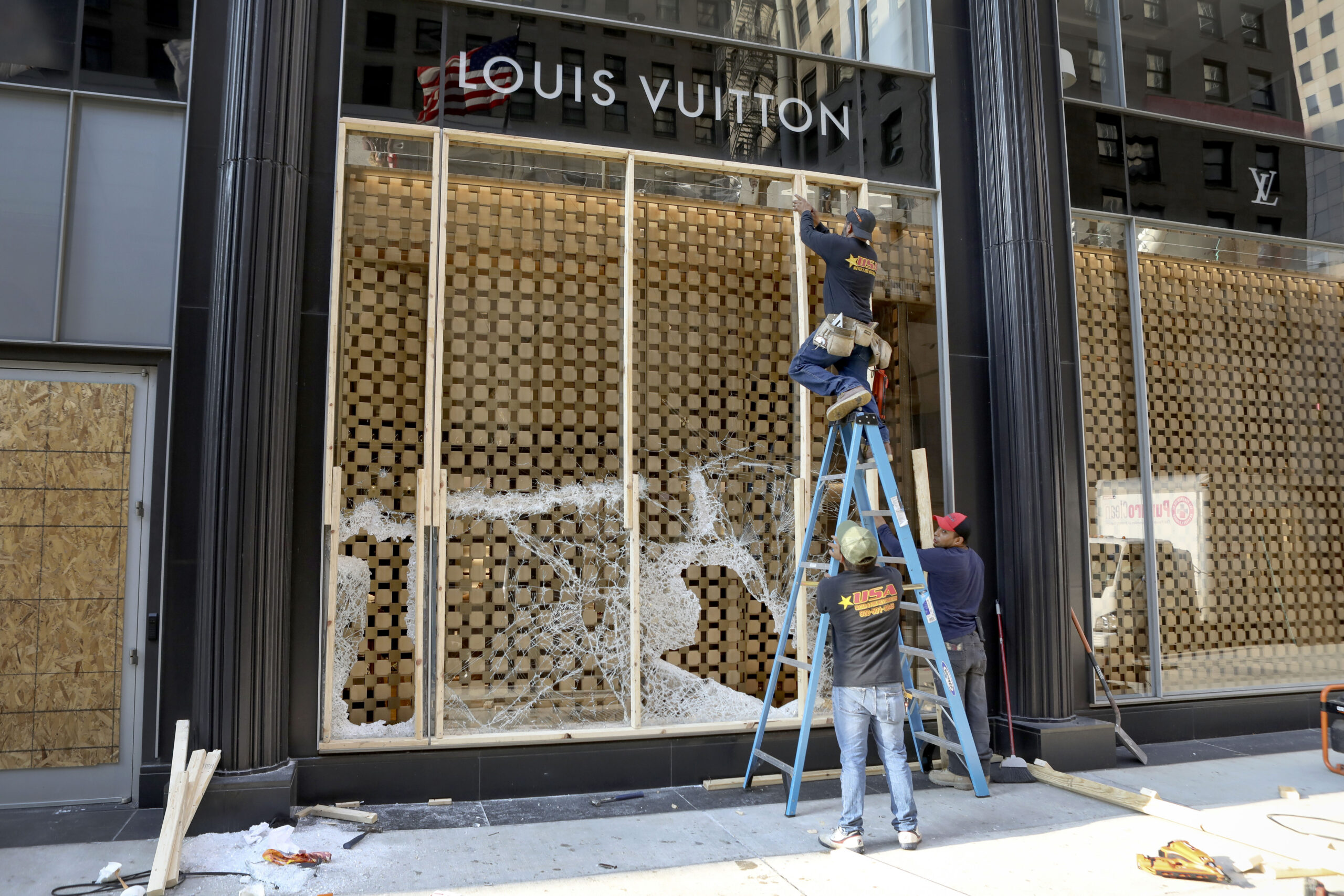
“They took all the attention off of that, and it wasn’t for the betterment of us as a people,” said Mr. Bradley, president of United in Peace, Inc.
He agrees with Mayor Lightfoot and Superintendent Brown that those responsible should be held accountable.
“God has silenced everything and sports around the world so he can grab all our attention to ingrained racism, police murdering innocent individuals, criminal justice reform, police reform, racism in its totality,” Mr. Bradley argued.
Whether it is police or gang members involved in shooting of innocent people, perpetrators must be made aware of the consequences of their actions, said the longtime activist.
“Don’t let them hijack your movement. They are not peaceful protestors against the wrong things that’s happening within our society against us as a people and we can’t get caught up on that. If an individual’s wrong he’s wrong,” he said.
Mr. Bradley is also concerned the hostile environment is setting the stage for President Donald Trump to justify sending federal troops to Chicago.
“So, we’ve got to be aware of the agitator that’s creating something to try to create an atmosphere where there cannot be an election so there’s a lot that I see in that,” he said.
Willie J.R. Fleming is a Chicago-based activist who has also done international organizing work.
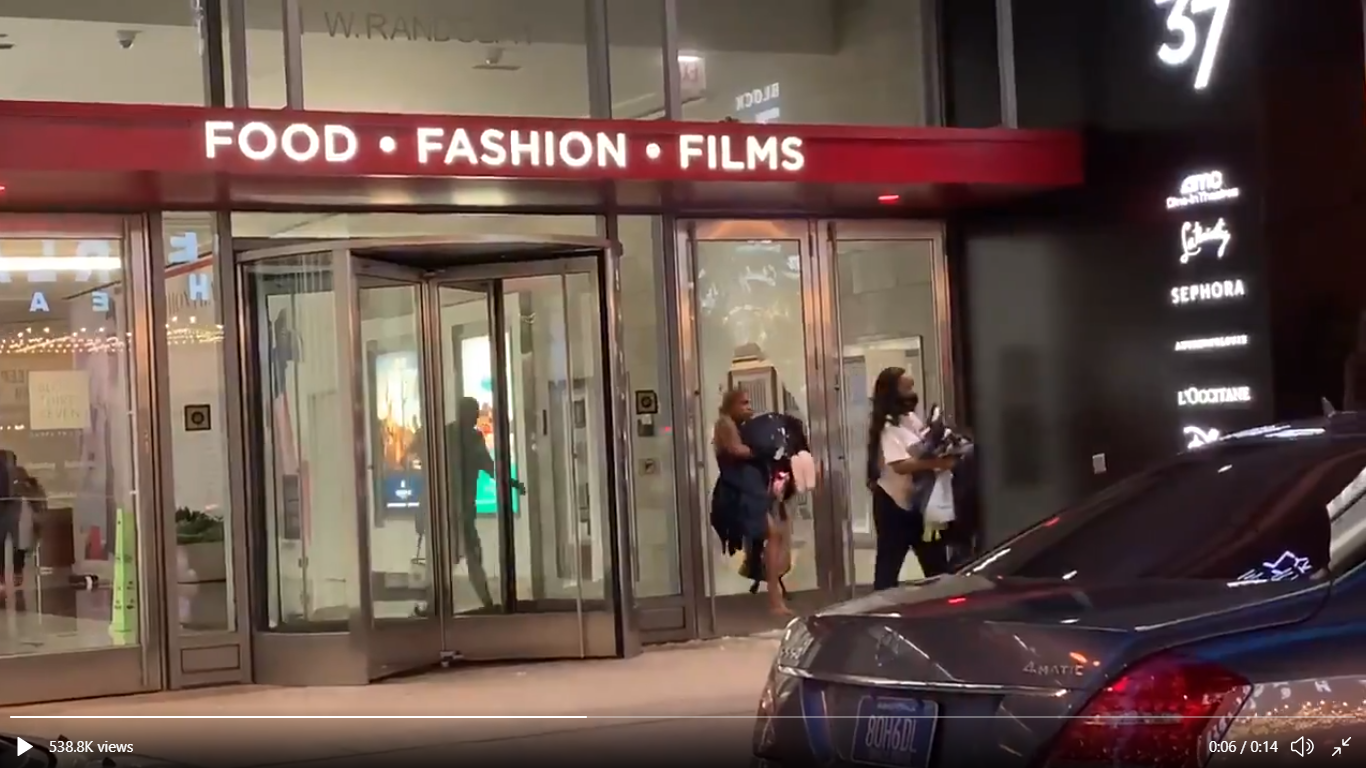
What sparked the violence downtown is penned up anger and frustration young, Black people in Chicago have been dealing with for years, he said.
Five years ago protestors converged on the Magnificent Mile during Black Friday boycotts in the aftermath of the police shooting death of LaQuan McDonald, a teenager shot 16 times, Mr. Fleming observed.
Few changes have been made, he said.
The message five years ago called for by Nation of Islam Minister Louis Farrakhan was borrowed from a 1968 phrase by Dr. Martin Luther King Jr. It was a call to “redistribute the pain” through economic withdrawal and have corporate America feel anguish Black, Brown and poor communities are forced to endure.
“That’s why we chose the Mag Mile right? To shut it down by blocking the stores five years ago,” explained Mr. Fleming. Young people want their pain to spread to others, he argued.
“They (young people) watch the police—as the state’s attorney stated today—utilize barbaric tactics against peaceful protests from my age group! What makes you think they’re gonna take on that model of peaceful protest? Why? It makes no sense. These young folks are fed up.”
Mr. Fleming, co-founder of the Chicago Anti-Eviction Campaign, said, “This was not organized. They made up their mind. Anytime there’s an injustice that they feel is of great value you’re going to see this, whether it’s downtown or in the community.”
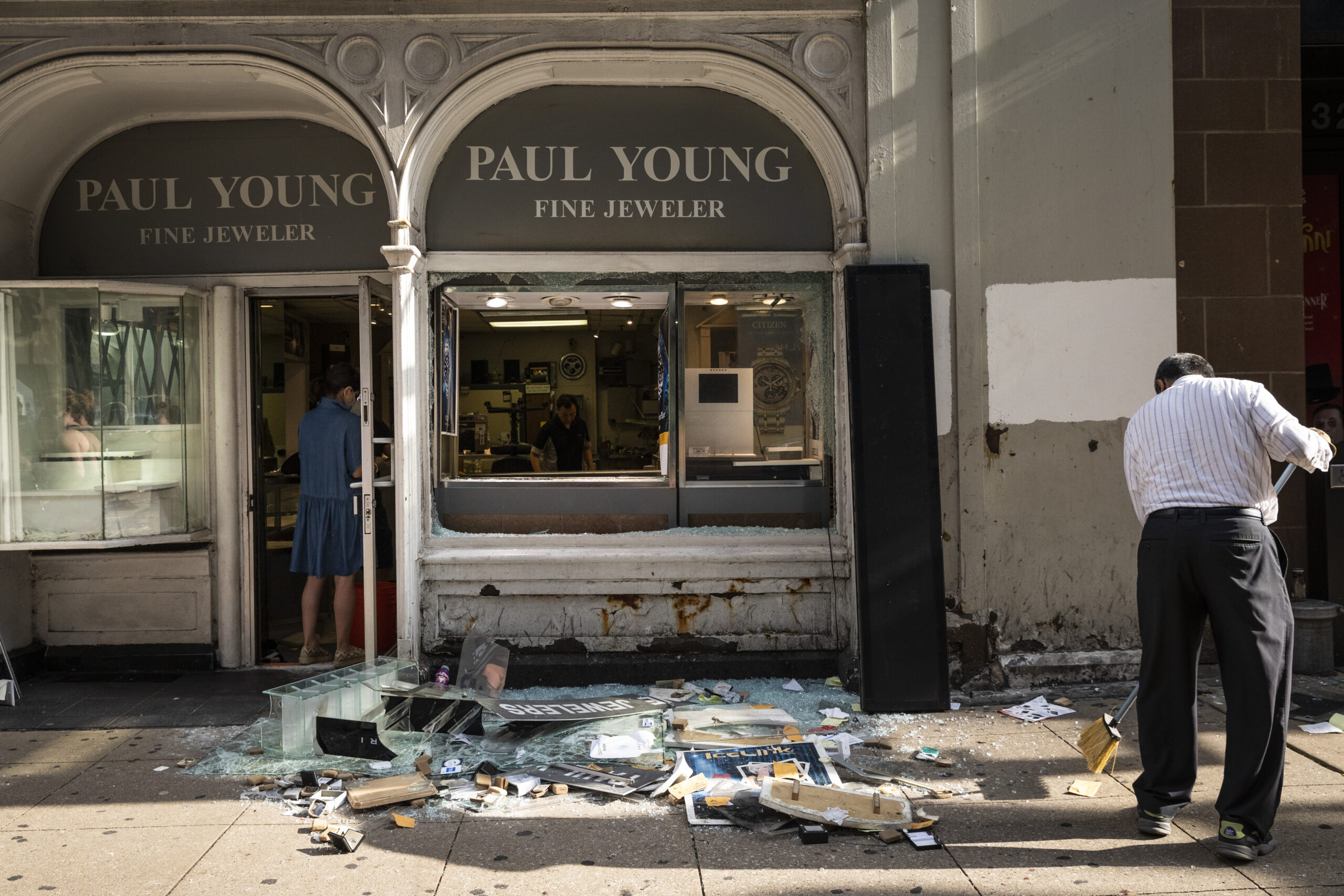
Student Minister Ava Muhammad is the national spokesperson for Minister Farrakhan and the Nation of Islam.
America’s system of capitalism, with wealth controlled by a few private individuals and corporations and the problems that produces, is something Min. Farrakhan has taught about, she said.
“This is not a true nation where there’s a cooperative or any form really of state-owned wealth. Everything that’s distributed is distributed through this oligarchy or this small circle of multi-billionaires who determine the quality of life for the rest of the country,” explained the attorney and Muslim student minister.
“I guess the question that has to be raised is how long does the corporate controlled U.S. government think that Black youth who are at the very bottom of this economic system are going to live the way they’re being forced to live without a reaction?” she asked.
Everything happening now dates back to 1555, which is the date the Most Honorable Elijah Muhammad gave as the year the first kidnapped Africans were brought to America in the holds of slave ships.
“This is an unbroken chain of oppression,” she said. “And now we live in a time where the wealthy display their wealth to the average person and poor people.
“And so, how long are you going to rub something in my face, particularly when we’re talking about young people in their teens and early 20s who are already at that age level, where appearance is important, possession of material things is important to them.”
“It’s the Nikes of the world who ran the commercials and make young children think I have to have this pair of shoes. You bypass the parents, and you actually kidnap our children’s minds.
“Meanwhile, you take away every possible avenue to education, income. Schools are closed. There are no jobs. What are they supposed to do with nothing?” she asked.
The fact that affluent areas were targeted is reflective of an awareness, she argued.
“I saw somebody sweeping up in front of Jimmy Choo. Okay, when you’re charging $4,000 for a pair of shoes … What they did, smashing some windows … and we don’t condone it by any stretch. We don’t believe in breaking the law at any level—but how dare you talk about theft when you stole a people from the African continent! A people!” said Student Minister Muhammad.
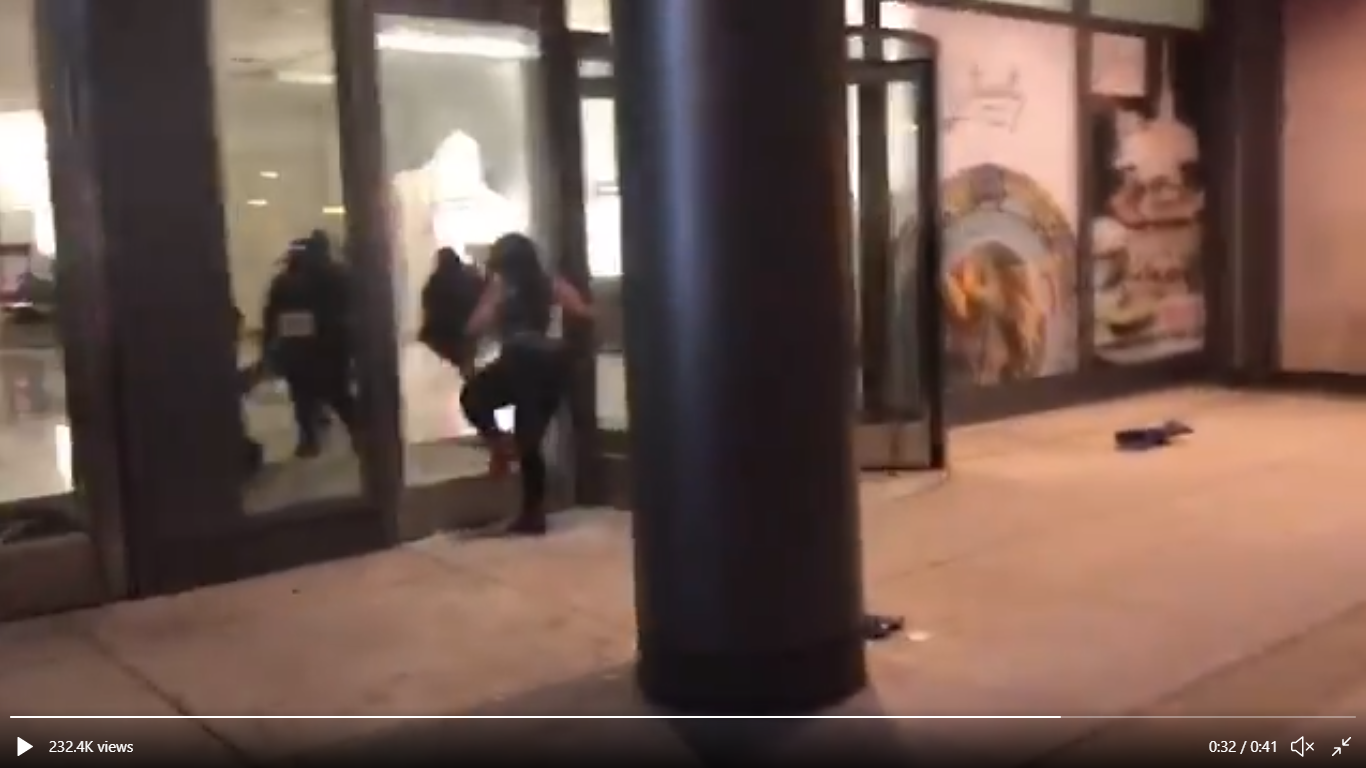
“It is the ancestors of these young people who put you where you’re sitting, and you can’t find it anywhere in you to engage in some measure of justice? It’s not even some reparations? Because you can’t make up for this wrong, you can’t. This is a wrong you can’t correct but you could have displayed some level of remorse at some point.”
Things are at a breaking point, agreed Mr. Fleming.
“Covid-19, shelter in place, a lot of (youth) not going back to the school traditionally the way they would and school has been their avenue to get away from the home, the community for a lot of them. The frustration, pardon the language, they’re getting tired of this s–t.”
Mental health issues, housing and food insecurity, lack of education and jobs are just a few of the struggles that young people in Black Chicago face.
The pandemic added additional problems on top of anger and frustration already at a boiling point, Mr. Fleming said.
Neither local, state or the federal government are adequately equipped to deal with what is happening in terms of the inequities that breed poverty and violence in Black and poor communities, the activist continued.
They don’t have the will or commitment necessary to put funding where it really needs to be and into the hands of groups and organizations that can truly make a difference among Black people, he argued.
Threatening arrests and prosecution for individuals who may have been involved in the looting defers responsibility from what government officials could really do, he observed.
Mr. Fleming added, “Give credit where credit is due. Minister Farrakhan said that a generation will be born of the fearless, that a generation was rising. He even called for the 10,000 Fearless to prepare the community for it. He said that it was time that folks was going to redistribute the pain. I think this is a redistribution of pain.”
How much more can the city stand and what comes next—federal agents already announced from President Trump, what about the National Guard? And, demands came from the mayor and top cop that judges and prosecutors press harsh charges against those involved in looting.
“We do not need federal troops in Chicago,” declared Mayor Lightfoot.
Help with enforcing gun laws, supporting federal agencies dealing with illegal weapons and purchases and do those things the feds can do, don’t saber rattle, she said in response to media questions.
The National Guard isn’t needed, but the state police are helping and discussions with the governor will continue, said the mayor.
Gov. J. B. Pritzker vowed to continue to support the city with state police and other help the mayor would need. “These were criminals. This was criminal activity and those criminals need to be prosecuted,” the governor said with the mayor by his side.
An alderman representing the Magnificent Mile said the city could not continue to survive these revulsions and the city’s survival was a stake.
Over social media, many Whites complained that May and June anti-police brutality protests—and some outbreaks of crime—were not handled well. Looters, criminals, thieves complained the mayor and police chief, saying there were too few consequences.
There have to be consequences identifying those responsible and a serious response from the courts and prosecutors, said the mayor.
Police off days are canceled, 12-hour shifts are imposed with protections for downtown businesses and then police deployed to neighborhoods, said police chief Brown. Access to downtown will be limited in evenings until early mornings, he added.
As the city notes, “the Magnificent Mile encompasses a stretch of North Michigan Avenue that runs from the banks of the Chicago River to the south, to Oak Street to the north. The Magnificent Mile district extends a full square mile from North Michigan Avenue, including East to the scenic lakefront.
“The Magnificent Mile prides itself as ‘a spectacular showcase of style, flavor, entertainment and fun,’ boasting more than 460 stores, 275 restaurants, 60 hotels, entertainments and attractions.”
It helps draw millions to the city and two years ago was enjoying record breaking number of nearly 60 million visitors, according to the city tourism information.












